Period 2预习案(课本P27~P28)Unit 5 Do you have a soccer ball七年级英语人教(2018秋上册)高分突破课件
最新人教版八年级上册英语Unit4 Period 2预习案(课本P27~P28)

试比较以下对话:
(1)— How long does it take from your home to the
park? —10 minutes.
(2)— How do you go to school? —By bus.
(3)— How far is it from school? —10 minutes’ ride.
返回
英语
二、重点短语
1.离家最近的
be to
the closest home
4.好得多
2.相当差 pretty bad 5.更擅长于
3.一点也不 not…at all
much better
be better at/do better in
返回
英语
三、经典句型
1.——镇上最差的服装店是 —Which is the worst clothes
哪家?
store in town?
——梦想服装店。
—Dream Clothes.
2.——你认为调幅970 兆赫 —What do you think of 970
电台怎么样?
AM?
——我认为调幅970 兆赫电 —I think 970 AM is pretty
台相当差。
bad.
返回
英语
四、完成句子,词数不限。 1.这家电影院好得多。 This movie theater is much better 2.它离家最近。It’s the closest to 3.琳更擅长打网球。 Lynn is better at/does better in
返回
英语
3.注意以下句型是用比较级表示最高级的含义: He’s taller than anyone in our class.=He’s taller than any other student in our class. =He’s taller than the other students in our class. =He’s the tallest in our class. 总结:any other+单数名词,the other后面如果接可数名词要用 复数。
七年级英语上册Unit5-Do-you-have-a-soccer-ball优秀教案
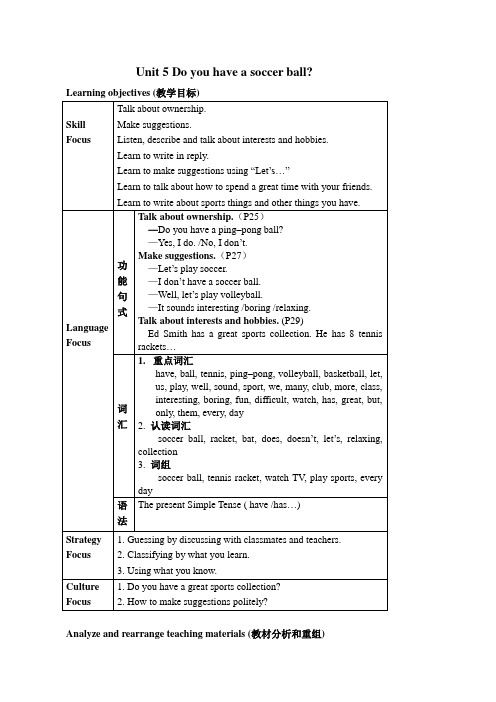
Unit 5 Do you have a soccer ball? Learning objectives (教学目标)Analyze and rearrange teaching materials (教材分析和重组)1. 教材分析本单元以“Do you have a soccer ball?”为话题, 共设计了三个部分的内容。
Section A该部分有4个模块:第一模块围绕“Do you have a soccer ball?”这一话题展开词汇学(1a)、听力(1b)、口语(1c)训练;第二模块继续围绕“Do /Does… have a…?”进行听力(2a-2b)、口语训练(2c);第三模块围绕“Make suggestions.”这一话题展开训练,训练形式为单词填空(3a)和角色表演谈论图画为训练形式(3b);第四模块就“Complete the forms according to the sports club you like.”以结对活动形式进行介绍。
Section B该部分有4个模块:第一模块是词汇的学习(1a)与运用(1b);第二模块仍然围绕(1a-1b) 的词汇进行听力训练(2a-2b)、围绕提建议进行口语训练(2c);第三模块继续围绕“Ownership”这一话题展开有关收藏品阅读(3a), 写作训练(3b-3c);第四模块仍就“Ownership”这一话题以口语训练形式展开全班活动。
Self Check该部分有3个模块:第一模块以填空形式对所学词汇进行训练;第二模块以默写已学过的五个单词的形式对所学的词汇继续巩固复习; 第三模块围绕有关ownership和suggestions对话开展口语训练和写作训练。
教材重组和课时分配Period 1 (Section A: 1a, 1b, 1c) New function presenting Period 2 (Section A: 2a, 2b, 2c, 3a, 3b, 4) PracticePeriod 3 (Section B: 1a, 1b, 2a, 2b, 2c) V ocabulary building Period 4 (Section B: 3a, 3b, 4) Integrating skillsPeriod 5 (Self Check: 1, 2, 3 & Workbook) Self CheckPeriod 6 WritingTeaching procedures and ways (教学过程与方式)Period One New function presentingLanguage goals (语言目标)1. Words & expressions: have, soccer ball, tennis, racket, tennis racket,ping–pong, volleyball, basketball, bat (P25)2.Key sentences: Do you have a ping–pong ball?Yes, I do. No, I don’t. (P25)Ability goals (能力目标)Enable the students to understand and talk about ownership and make suggestions.Emotion & attitude goals (情感和态度目标)Enable the students to form positive attitude toward sports collection and love sports, keep healthy and learn to make suggestions politely. Strategy goals (策略目标)To understand the target language by reading pictures, drawing pictures, countingnumbers, drawing a chart.Culture awareness goals (文化意识目标)People’s attitude toward sports collections is different in English speaking countries.Teaching important points (教学重点)Talk about ownership and make suggestions.Teaching procedures & ways (教学过程和方式)Step 1. Revision and Lead-inAsk one or more students to show their homework.T: In the last unit, I ask you to do a project about filling in the chart because we want to have a ball game. But we don’t know what kind of balls you have. Please ask your classmates in the group what balls he /she has. Then write down the information in the chart. Now who wants to display your project on the blackboard?T: Do you have tennis? S: Yes, I do.Second point to the others in the classroom.T: Does Wang Wei have tennis? S: Yes, he does.Third point to Li Hong in the classroom who has ping–pong ball, but no tennis.T: Do you have tennis?S: No, I don’t.T: Do you have a ping–pong ball?S: Yes, I do.T: Does Li Hong have tennis?Ss: No, she doesn’t.T: Does Li Hong have a ping–pong ball?Ss: Yes, she does.T: Today we are going to learn how to talk about ownership and make suggestions.Step 2. Listing and SpeakingAsk the students to read the picture on Page 25.T: What can you see in the picture?Ss: We can see a ping–pong ball, a ping–pong bat, a tennis racket, a soccer ball, volleyball, a basketball, a TV, a computer game.T: Ask the students to match the words with the things in the picture.Ss: Say, Number 1 is (C), tennis racket. Number 2 is (a), ping–pong ball…After checking the answers in 1a, ask the students to read aloud the new words again and again, ask and answer about them in pairs. And then play the recording again. This time students listen to conversation and circle the words they hear. And then check the answers. Students circle ping–pong bat and computer game.Step 3. Pair workAsk the students to read the example conversation. Have students repeat. And then point to the television in the illustration and substitute that word in the conversation. Have students repeat again. And then ask students to practice the conversation in pairs and remind them to use various objects from the illustration. As students practice, move around the classroom to check progress and help with pronunciation.Ask for more ideas from the students and write their ideas on the blackboard.p hone, cars, pencil case, eraser, pen, book, dictionary, watch, key, notebook, ring, sister , brother, chair, bookcase, CD, video tape, hat, desk, dresser…Show the following to the students and then ask them to practice in pairs.—Do you have a phone?—Yes, I do.—Do you have a CD?—No, I don’t.T: Now work in pairs, make conversations with the newwords in 1a and act it out around the students.Sample conversations:1. S1: Do you have a ping–pong bat?S2: Yes, I do.S1: Do you have a ping–pong bat?S2: No, I don’t.2. S3: Do you have volleyball?S4: Yes, I do.S3: Do you have a basketball?S4: No, I don’t.3. S5: Do you have a tennis racket?S6: Yes, I do.S5: Do you have a TV?S6: No, I don’t.Step 4. Homework1. Ask the students to do more practice as required in 1 c on Page 25.2. Ask the students to prepare the next period. Think about the usage of “Does she /he have…?”Period Two PracticeLanguage goals (语言目标)1. Words & expressions: does, doesn’t, let, us, let’s, play, well, sound,good, sport, we, many, club, more, class (P26)2. Key sentences:—Let’s play volleyball.—That sounds good. (P26)Ability goals (能力目标)Enable the students to make suggestions politely.Emotion & attitude goals (情感和态度目标)Train the Ss to make suggestions politely and take activity part in school sports club and keep healthy.Strategy goals (策略目标)Enable the students to match the problems and worries.Culture awareness goals (文化意识目标)Learn to how to make suggestions politely.Teaching important points (教学重点)Talk about making suggestions.Teaching procedures & ways (教学过程和方式)Step 1. RevisionBefore class, let’s have a revision. First make up a conversation with “Do you have…?”about ownership, and then in threes make up a conversation with “Do you have…? Does she /he have…?”Sample dialogues:1. S1: Do you have a soccer ball? S2: Yes, I do.S1: Do you have a basketball? S2: No, I don’t.2. S1: Do you have a computer game? S2: No, I don’t.S1: Do you have a ping–pong bat? S2: Yes, I do.S3: Does he have a computer game? S1: No, he doesn’t.S3: Does he have a ping–pong bat? S1: Yes, he does.Step 2. Listening PracticePlay the recording for the first time.T: Listen to the tape. You only listen.Play the recording for the second time. Then check the answers.T: You’ll hear the same conversation again in the picture. This time please listen for the names in the pictures, and then number the pictures (1-4).After that ask a few students to say out their answers in 2a.S1: The answers are 3, 1, 4, 2.S2: Number the pictures: 3, 1, 4, 2.Play the recording for the third time.T: You will hear the conversations for the third time. You are to match the people from activity 2a to the balls in the recording for the fourth time and then correct the answers.T: You listen to the tape and write the numbers from the pictures in 2b next to the correct balls.After doing listening, talk about the dialogue about 2b, and then ask some students to say out their answers in 2b.S3: The answers are 3, 2, 1, 4.S4: They are 3, 2, 1, 4.Step 3. Pair workLook at the things in the picture. Ask your partner if he /she has the things in 2c.Ask the students to act out the conversation in pairs.Sample conversations:1. S1: Do you have a dictionary? S2: Yes, I do.S1: Do you have an eraser? S2: No, I don’t.2. S3: Do you have a baseball? S4: No, I don’t.S3: Do you have a football? S4: Yes, I do.3. S5: Does Tom have volleyball? S6: Yes, he does.S6: Does Mike have a pen? S5: No, he doesn’t.Step 4. PracticeLook at 3a, point out the words in the box and then ask a student to read aloud the four words to the class.T: Fill in the blanks with the words from the box alone. I’m sure you’ll fill in the correct answers. And now who’ll tell me the answers? Please hand up if you know the answers. Oh, thank you, --------!S1: The answers are: 1. don’t,2. Let’s,3; have,4. soccer.T: You are right. Thank you. Now let’s practise reading aloud the conversations in pairs and act them out. And then tell the students how to make suggestions politely using “Let’s…!”For example:T: Let’s play ping–pong ball./ Let’s play tennis./ Let’s play volleyball…S: That sounds good.After finishing practising the conversations in 3a, ask the students to make conversations with their partners according to the pictures below in 3b. Ask the students to point to each one and describe each object. Show the students how to use the pairs of pictures as substitutes in the conversation.For example:T: Let’s play basketball.S: I don’t have a basketball.T: Well, let’s play football.S: That sounds good.Ask pairs of students to perform the conversation for the class and tell them how to make suggestions politely in 3b.Step 5. Writing and practiceThis activity gives students a chance to role play a conversation about sports. Students review the language of introductions, and then complete the form, introduce themselves to the coach.T: What sports do you like to play? Who are your favorite sportsmen and sports women? What sports are available at school?S1: I like to play football. My favorite sports man is Liu Xiang. Basketball and volleyball are available at our school.T: Our school has a sports Club with all the sport that you would like to play. If you would like to join the school sports club, please fill in the form with your personal information. When students have completed filling in the form, divide them into pairs.T: Wha t’s your first name? What’s your last name? What sports do you like? Do you like…? What class are you in?S: My first name is Li. My last name is . I like ping–pong ball. I’m in Class 4, Grade 7.Have students role play the conversation between a student and coach. Walk around the class and offer help where necessary.Step 6. SummaryAsk some students to sum up what we have learned key vocabulary and the target languages.Step 7. Today’s homeworkT: First make up dialogues with “ownership and make suggestions” in pairs /in groups. Next class I’ll ask you to act them out. Second, prepare for the next class P 28 (1a, 1b, 2a, 2b, 2c).Period Three New vocabularyLanguage goals (语言目标)1.Words & expressions:interesting, boring, fun, difficult,relaxing, watch, watch TV (P28)2. Key sentences: (1) Let’s play computer games.(2) That sounds interesting. (P28)Ability goals (能力目标)Enable the students to learn to make suggestions politely and responses.Emotion & attitude goals (情感和态度目标)Enable the students to learn to express their feelings about different suggestions.Strategy goals (策略目标)Enable the students to know how to express their feelings aboutdifferent suggestions.Culture awareness goals (文化意识目标)Different countries, different suggestions.Teaching important points (教学重点)Learn to how to express different suggestions and responses. Teaching procedures & ways (教学过程和方式)Step 1. Revision and word studyCheck the homework:T: Last class we asked the students to make up conversationswith “ownership and make suggestions”in pairs /ingroups. Now we’ll ask you to act them out.Point to the five words and ask the students to repeat each one,and then point to the five pictures and ask the students tomatch each picture with one of the words in section B (1a).Ask the students to write the letter of the picture on the linenext to each word.Ask the students to say out the answers. Go around the room,asking students to point to a picture and say the word that goeswith that picture. The answers are: 1. c; 2. d; 3. e; 4. b; 5. a.Step 2. Guessing the wordsThis activity makes students practise using the vocabularywords from this unit. Point to the picture in 1a and reviewthe words.T: Now please draw pictures that show somethinginteresting, boring, fun, difficult or relaxing. Please showyour pictures to some of your classmates. Everyone triesto guess the meaning.Step 3. Listening and word studyBefore playing the recording for the first time, point out thefive words in 1a above and ask a student to read them aloudto the class.Play the recording for the first time in 2a.T: Listen to the tape carefully and remember the fouradjective words you hear.Play the recording for the second time.T: Listen to the conversation and put a checkmark to the leftof each word in 1a that you hear.Ask the two students to say out their answers.Ss: The answers are: a. interesting; b. boring; c. fun;d. difficult;e. relaxing.Step 4. Listening and writingT: I’ll ask a student to read the name of each activity to theclass. And then I’ll play the tape. Listen to the tapecarefully for the first time and remember what Tony saysabout these activities. I’ll play the recording again. Thistime listen to the conversation and write the word in theblank.After listening to the tape for the second time, ask somestudents to read the same example to the class.Ss: The answers are: 1. interesting; 2. difficult; 3. boring; 4. fun.Step 5. Practice and actingBefore asking the two students to read the dialogues, listthese activities on the blackboard: play computer games,play volleyball, watch TV, play basketball.T: I’ll ask the two students to act out the dialogues, talkingabout the activities in 2b.One acts as Jenny, the other acts as Tony, move around theclassroom offering languages support and checkingprogress when the students talk about the activities. Ask afew pairs of students to perform their conversations for theclass.Sample dialogues:1. S1: Let’s play volleyball.S2: That sounds fun.2. S3: Let’s watch TV.S4: That sounds boring.Step 6. Summary1. This class we have learned how to make suggestions andresponses politely. We also have learned how to use somedescription adjectives.2. Prepare for the next class.Step 7. Today’s homework1. Make up dialogues about “Make suggestions and responses”.2. Prepare for the next lesson.Period Four Integrating skillsLanguage goals (语言目标)1. Words & expressions:has, great, collection, but, play sports,only,them, a great sports collection, tennis racket, soccer ball, onTV, everyday (P29)2.Key sentences: (1) Ed Smith has a great collection.(2) But he doesn’t play sports—he only watches them on TV.Ability goals (能力目标)Train the ability of the students about reading and writing.Emotion & attitude goals (情感和态度目标)Enable students to form wide interests and hobbies.Strategy goals (策略目标)Enable students to collect what they like.Culture awareness goals (文化意识目标)Enable students to understand different people have different interests and hobbies.Teaching important & difficult points (教学重点和教学难点)1. The plural form of noun.2. The Present Simple TenseTeaching procedures & ways (教学过程与方式)Step 1. RevisionFirst check the homework, and then ask a few pairs to act out the conversation about: Making suggestions and responses.T: Who can make up a dialogue about making suggestions and responses in pairs?S1: Let’s play football.S2: That sounds fun, but I don’t have a football.S1: Well, do you have a basketball?S2: Yes, I do.S1: Then let’s play basketball.S2: Oh, basketball is so different.S1: OK. Let’s play ping–pong ball.S2: That sounds boring. Let’s play computer game! Do you havea computer?S1: Yes, I do.S2: That sounds interesting.Step 2. ReadingBefore reading this magazine article, ask students to name everything they see in the picture (3a).T: Read the article by yourself, and then circle the vocabulary words that are about sports activities.Give examples such as a stamps collection or a coin collection.T: Please close your books, look at the overhead projector, listen to me carefully, and then fill in the blanks with the sports things in 3a. Please tell the students the answers.S1: 1. tennis racket; 2. basketball; 3. baseball; 4. soccer ball; 5. volleyballT: Y ou’re right. OK. Thank you! Pay attention to the usage of thePresent Simple Tense and the plural form of noun.Explain the usage of the grammar and some key sentences, ask the students to retell the text next class.Step 3. Reading and writingBefore reading this article, ask students to name everything they see in the picture (3b). And then read the article to the class. Ask students to look at the picture and fill in the blanks by themselves. After that, let the students correct the answers in pairs. Ask three students to write their answers on the blackboard. (The answers are: 1. baseball; 2. basketball; 3. tennis rackets; 4. volleyball.)After finishing filling in the blanks, explain the usage of the Present Simple Tense, the plural form of noun and some key words, key sentences. Ask students to recite the text (3b).Step 4. Writing and SpeakingT: After finishing learning the articles about 3a and 3b, now you write about yourself. Talk about your hobbies and interests such as:What sports do you play?What sports things do you have?What other things do you do? And so on.After a while I’ll ask some students to read their stories to the class.S1: I collect coins. I have ten American coins, five Russian coins.S2: I have a great toy cars collection. I have two Chinese toy cars, threeJapanese toy cars, four British toy cars. I play them every day.Step 5. Spoken English and writingNow look at 4 Survey, write “have,you, an alarm clock, do”on the blackboard.T: Please say the words in the correct order to make a question. Come tothe blackboard, Wang Fei.S1: Do you have an alarm clock?T: OK, you’re right. Thank you. Please write a student’s name under thequestion on the blackboard. Who can do it? OK, Yang Fan, please.S2: Li Gang.T: OK, Li Gang, please come to the blackboard. Do you have an alarm clock?Guide him to answer “Yes, I do. /No, I don’t.”S3: Yes, I do.T: Now, please write four questions like this. After that ask students to say other things they might ask. As the students complete the questions, move around the classroom checking progress and offering suggestions as needed, at the same time ask students to move around the room, asking their questions and writing in names. In this way the students learn the target language easily. Step 6. Today’s homework1. Write a story about your /his /her collection.2. Make up dialogue with “Do you have…?”3. Finish off all the exercises on the small blackboard.Period FiveLanguage goals (语言目标)1. Words & expressions: basketball, tennis racket, baseball bat, ping–pong ball,soccer ball, volleyball, interesting, boring, run, difficult, relaxing, TV2. Key sentences: (1) Do you have a ball? Yes, I do.(2) —Let’s play soccer.—That sounds good./It’s boring.Ability goals (能力目标)Train students’ writing abilities.Emotion & attitude goals (情感和态度目标)Learn to talk about ownership and make suggestions.Strategy goals (策略目标)Enable students to form wide interests and hobbies.Culture awareness goals (文化意识目标)Enable students to understand the different countries have different suggestions and hobbies.Teaching important & difficult points (教学重点和教学难点)Learn to how to talk about ownership and make suggestions. Teaching procedures & ways (教学过程与方式)Step 1. RevisionBefore class ask a few students to read aloud the stories about themselves, and then have some pairs act out dialogues about ownership. Also give students three minutes to have a free talk.Step 2. Words checkingThis activity provides a comprehensive review of key vocabulary presented in this unit.T: Now let’s go over key vocabulary in this unit. I speak Chinese, you speak English. First answer my questions one by one, and then answer my questions together. OK let’s begin.有趣的,无聊的,休闲的……篮球,网球球拍……Ss: Interesting , boring, relaxing…T: OK, so much for this. Now take out your English exercises books, write five new words in it, and then share your lists with your groups.Step 3. Reading and writingThis activity focuses on students understanding of the target language in the unit.T: Please read aloud the following sentences in 3a, and then number the sentences to make a conversation that follows the situations in the pictures by yourself.After a while, check the students’ answers. The answers are: 5, 1, 4, 2, 3, 6, 7.After checking the answers, ask the students to act out the dialogue and recite it.T: Now look at the chart on the blackboard with the names of five activities and five words at the top: interesting, boring, fun, difficult, relaxing. And then make up a dialogue talking about ownership and makingAsk two students to act out the dialogue.S1: Let’s play baseball!S2: That sounds interesting, but I don’t have a baseball.S1: …S2: …Step 4. Group workT: The class ball games will be held soon. The students in the class are training recently. Please give suggestions to your group and ask them to train after class.As you make up conversations, please use the drills “Do you have a…? /Yes, I do. /No, I don’t / Let’s… /No, it’s boring.”Step 5. Homework1. Finish off all he exercises in the workbook.2. Talk about your friends’hobbies. (play basketball /soccer ball /ping–pong ball /watch TV /play computer games /play sports every day)Period Six Writing(ppt展示)Teaching Resources (教学资源库)1.语法:(1) 名词复数的构成及读音规律:特别提醒:名词复数的不规则变化是:①只变元音字母,如:man—men, woman —women, foot—feet, policeman—policemen ②单复数形式一样,如:a fish—some fish, a Japanese —some Japanese ③其它变化,如:child—children等。
最新人教版八年级上册英语Unit5 Period 2预习案(课本P35~P36)
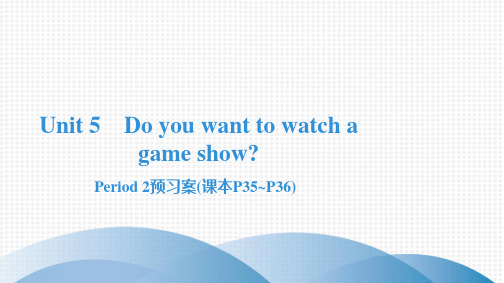
world.
返回
英语
3.——你认为访谈节目怎么 —What do you think of talk
样?
shows?
——我不介意它们。/ 我不能 —I don’t mind them./ I
忍受它们!/
can’t stand them!/I love
我喜欢看它们!
watching them!
返回
英语
the sweaters but she doesn’t
the skirts.
A.minds;stand
B.minds;stands
C.mind;stands
D.stand;mind
返回
英语
2.Do you want to watch the news?你想看新闻节目吗? What do you plan to watch tonight?你今晚打算看什么? What can you expect to learn from sitcoms?你期望能从情景 喜剧中学到什么? 以上黑体的部分称为动词不定式,在句中可作主语、宾语、 表语、宾语补足语、定语、状语等。它跟在动词后面作宾语, 常接动词不定式作宾语的动词 有:want,hope,plan,expect,decide,agree,wish,help,choose等。
Unit 5 Do you want to watch a game show?
Period 2预习案(课本P35~P36)
英语
目录
01 学习目标 02 课前预习 03 思考探究
英语
学习目标
1.学习动词不定式的用法。 2.学会讨论自己的喜好及其原因。
返回
英语
课前预习
一、必背单词
七年级英语上册5单元Doyouhaveasoccerball预习案2
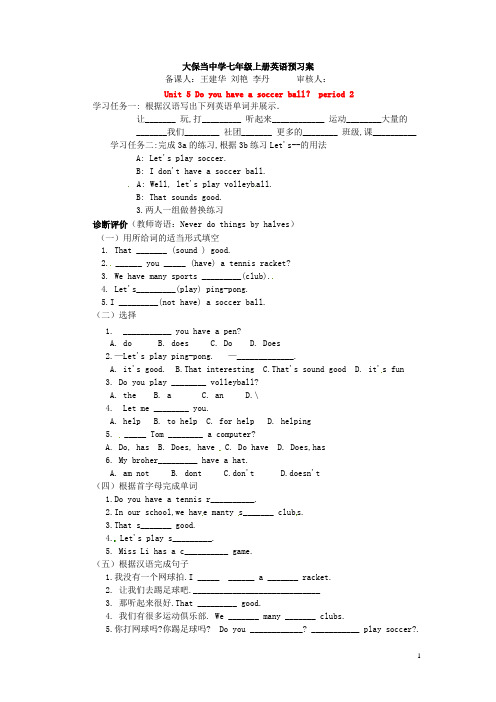
大保当中学七年级上册英语预习案备课人:王建华刘艳李丹审核人:Unit 5 Do you have a soccer ball? period 2学习任务一: 根据汉语写出下列英语单词并展示.让_______ 玩,打_________ 听起来____________ 运动________大量的_______我们________ 社团_______ 更多的________ 班级,课__________ 学习任务二:完成3a的练习,根据3b练习Let's--的用法A: Let's play soccer.B: I don't have a soccer ball.A: Well, let's play volleyb all.B: That sounds good.3.两人一组做替换练习诊断评价(教师寄语:Never do things by halves)(一)用所给词的适当形式填空1. That _______ (sound ) good.2. ______ you _____ (have) a tennis racket?3. We have many sports _________(club).4. Let's_________(play) ping-pong.5.I _________(not have) a soccer ball.(二)选择1. ___________ you have a pen?A. doB. doesC. DoD. Does2.—Let's play ping-pong. —_____________.A. it's good.B.That interestingC.That's sound goodD. it's fun3. Do you play ________ volleyball?A. theB. aC. anD.\4. Let me ________ you.A. helpB. to helpC. for helpD. helping5. _____ Tom ________ a computer?A. Do, hasB. Does, haveC. Do haveD. Does,has6. My broher_________ have a hat.A. am notB. dontC.don'tD.doesn't(四)根据首字母完成单词1.Do you have a tennis r__________.2.In our school,we hav e manty s_______ club s.3.That s_______ good.4. Let's play s_________.5. Miss Li has a c__________ game.(五)根据汉语完成句子1.我没有一个网球拍.I _____ ______ a _______ racket.2. 让我们去踢足球吧._____________________________3. 那听起来很好.That _________ good.4. 我们有很多运动俱乐部. We _______ many _______ clubs.5.你打网球吗?你踢足球吗? Do you ____________? ___________ play soccer?.。
人教新目标八年级上册(新)英语教案:Unit 5 Do you wa

2a
时间
6 m
6
完成2a任务,为顺利阅读铺平道路
Discuss the following questions with a partner.
1.Do you like to watch cartoons?
2.What is your favorite cartoon?
6.能够流利朗读文章。
教学过程
活动
步骤
教与学活动目的及其操作
教学资源运用
复习
时间
4 m
1
复习已学目标语和谈论电视节目的话题
Look at the cartoon and answer my questions.
— What do you think of cartoons?
— I love them because they’re enjoyable and wonderful. How about you?
3.Why do you like it?
First, ask three students to answer the three questions.
7
针对目标语进行控制性的实践活动
Discuss these questions in a group. Write down others’ answers and give a report.
9
快速读短文,完成任务
Let’s read the passage quickly and then finish the time line.
第一遍阅读是让学生获取活动内容,引导学生关注阅读内容,从中提取有用信息。
最新人教版九年级全一册英语Unit 4 Period 2预习案 (课本P27~P28)
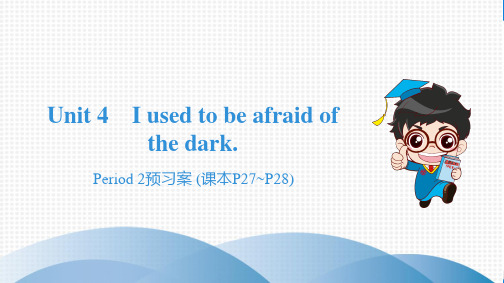
thing.She always has to worry about how she appears to
others and she has to be very careful about what she says or
does.And she doesn’t have much private time anymore.7.
英语
【学以致用】
( A )1.She
live with her grandparents,but she
doesn’t now.
ed to B.is used to C.was used to ed
( C )2.Jenny
to be heavy.Now she is a little thin.
【学以致用】
( A )There
a number of books on science in our
school library,and in these years the number of them
growing larger and larger.
A.are; is B.is; are C.have; are D.has; has
10.n.民众 adj.公开的;公众的 public .
兼词
11.n.亚洲人 12.n.欧洲人
adj.亚洲(人)的 adj.欧洲(人)的
Asian. European.
13.n.非洲人 adj.非洲(人)的 African .
14.v.采访;面试 n.访谈;面试 interview .
返回
英语
二、重点短语
e es ed ing
返回
英语
( A )3.Lucy used to go to bed late,
人教版七年级英语上册课件:Unit 6 Period 2预习案

目录 contents
学习目标
【学习目标】 1.熟练地运用第一课时所学的句型。 2.学习一些新的形容词。
目录 contents
预习检测
一、请根据中文意思写出下列重点单词。 1.美妙的,伟大的adj.__g_re_a_t___________ 2.参加(比赛或运动);玩耍v._p_l_a_y__ 3.听起来好像v._s_o__u_n_d_____ 4.有趣的adj.__i_n_te_r_e_s_t_in_g______ 5.没趣的;令人厌倦的adj._b_o_r_in_g____
2.sound是系动词,后面跟形容词作表语。 如: His idea _s_o_u_n_d_s__g_o_o_d____! 他的主意听起来不错!
3.interesting 是表示主语的特性,“有趣 的”,而interested 表示主语“对……感兴 趣”。 如: (1)This book is __in__te_r_e_s_ti_n_g______. 这本书很有趣。 (2)I am __in_t_e_r_e_s_te_d_______ in this book. 我对这本书很感兴趣。
短语:play basketball打篮球, watch TV 看电视, play computer games玩电脑游戏
句型:1.—Do they have a basketball? —Yes,they do./No,they don’t. 2.—Does she have a tennis ball? —Yes,she does./No,she doesn’t. 3.—Let’s play! —That sounds good.
18.——他们有篮球吗? ——不,他们没有。 —__D_o__th_e_y__h_a_v_e____ a basketball? —No,they __d_o_n_’_t __________. 19.他有2个乒乓球拍。 He has two _p_in_g_-_p_o_n_g__b_a_t_s______ . 20.他有足球吗? _D_o__e_s___ he _h_a_v_e_____ a soccer ball?
八上unit5_Do_you_want_to_watch_a_game_show导学案

Unit5 Do you want to watch a game show? Section A (1a-2d)一.【教学目标】本单元的中心话题是“谈论个人的打算,及对某事物的看法意见”,让学生围绕电视节目谈论不同程度的喜好,及发表计划看某类电视节目的见解。
1)牢记本课时出现的所有电视节目名称。
2)对不同电视节目发表不同见解。
初步学会做计划的表达。
二.【自主预习】1、翻译官脱口秀______________ 肥皂剧_______________ 体育节目______________新闻_______________情景喜剧______________ 竞赛节目_______________才艺节目_______________介意__________ 忍受_____________ 认为希望做某事期待做某事_____________ 喜欢做某事计划做某事查明,发现世界各地__________ 讨论(v.&n.)___________1)你对脱口秀怎么看?我喜欢它们/我不介意它们/我不喜欢它们/我无法忍受它们你计划看新闻吗?是的。
为什么?因为我想弄清楚世界各地都在发生什么。
2)询问第三人称的计划及对电视节目的见解。
1. mind, 作名词指词组:身心也可作为可数名词,意思是思想,想法。
例句:她没有改变想法。
本单元中的mind是词,意思是。
后跟名词:他不介意体育节目。
后跟动词:mind doing sth. 你介意打开窗户吗?cational, 是词,意思是,一场有教育意思的电影名词形式是,一般作为不可数名词使用。
拓展:nature-- ,--national例句:我爸爸想让我接受更好的教育。
3.happen是词, 强调偶然性的发生。
happen to do sth.例句:我昨天碰巧在公园里遇到了玛丽。
4. plan, 做名词, 每人需要做一个计划。
做动词, 计划做某事。
例句:她计划学另一门语言。
Period 2 预习案 (课本P27~P28)

英语
(3)If you are friendly (friend)to your classmates,you
can get along well with them.
( C )(4)Many people like to keep a dog as a pet,because
dogs are very
返回
英语
【练习】用正确的短语填空。
(6)It rains a lot at this time of a year.
(7)There are a lot of/lots of
cars in the street.=There
are many cars in the street.
(8)The baby drinks lots of/a lot of/much
返回
英语
(3)他住在这个城市的南部。He lives in the south of the city. (4)这是一个位于南方的城市。This is a city in the south . 【拓展】表示方位的词还有:(5) east 东 (6) west 西 (7) north 北
返回
英语
really cool . 3.你为什么不喜欢老虎? Why don’t you like tigers? 4.莉莎喜欢穿黑白相间的衣服。 Lisa likes wearing black and white clothes.
返回
英语
思考探究
一、Why don’t you like tigers? 你为什么不喜欢老虎? Why don’t you…?是特殊疑问句Why do you…?的否定形式, 表示询问原因。 【回顾】在Period 1我们提到了“Why don’t you+动词原形 …?” 表示向对方提出(1) 建议 ,意为“为什么不……呢?” 其同义句为(2) Why not+动词原形…? 。
七年级英语上册Unit5Doyouh第1课时SectionA1a_2c学案人教
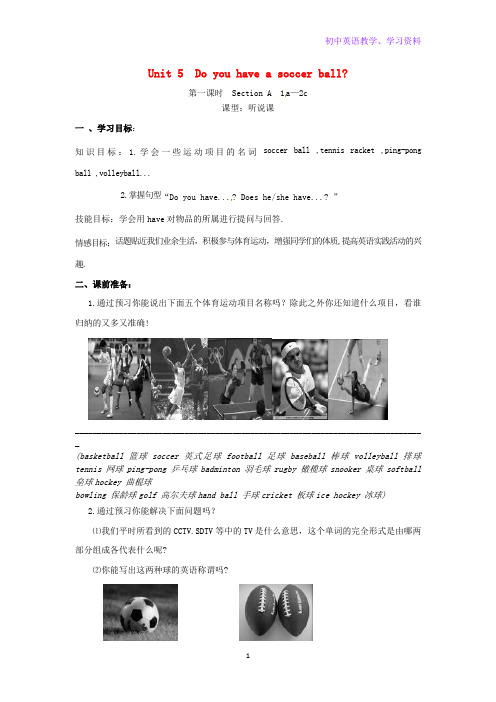
Unit 5 Do you have a soccer ball?第一课时 Section A 1a—2c课型:听说课一、学习目标:知识目标:1.学会一些运动项目的名词soccer ball ,tennis racket ,ping-pong ball ,volleyball...2.掌握句型“Do you have...? Does he/she have...? ”技能目标:学会用have对物品的所属进行提问与回答.情感目标:话题贴近我们业余生活,积极参与体育运动,增强同学们的体质,提高英语实践活动的兴趣.二、课前准备:1.通过预习你能说出下面五个体育运动项目名称吗?除此之外你还知道什么项目,看谁归纳的又多又准确!_______________________________________________________________________________ _(basketball 篮球soccer 英式足球football 足球baseball 棒球volleyball 排球tennis 网球ping-pong 乒乓球badminton 羽毛球rugby 橄榄球snooker 桌球softball 垒球hockey 曲棍球bowling 保龄球golf 高尔夫球hand ball 手球cricket 板球ice hockey 冰球)2.通过预习你能解决下面问题吗?⑴我们平时所看到的CCTV.SDTV等中的TV是什么意思,这个单词的完全形式是由哪两部分组成各代表什么呢?⑵你能写出这两种球的英语称谓吗?_______________ _______________-3.通过预习,你还有哪些疑惑?写在下面吧!_____________________________________________________________________________ _____________________________________________________________________________ ____三、学习过程:1.交流预习情况1)相互交流课前准备中的情况;2)讨论预习中遇到的疑问(学生相互解答,小组讨论或老师点拨)。
人教版七年级上册英语 Unit 5 Do you have a soccer ball导学案
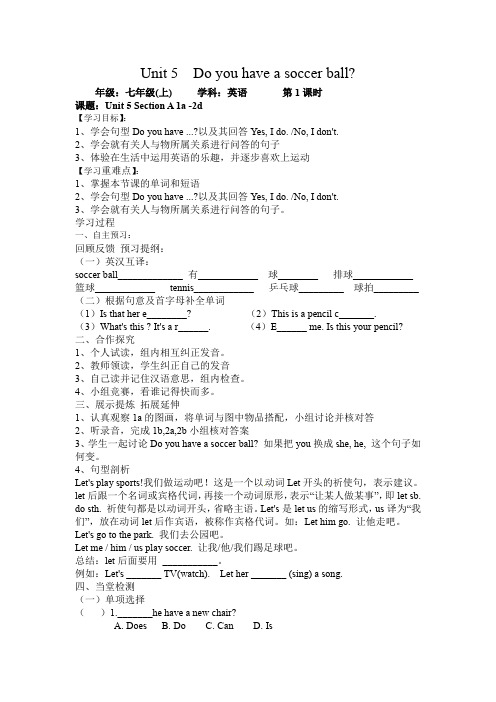
Unit 5 Do you have a soccer ball?年级:七年级(上) 学科:英语第1课时课题:Unit 5 Section A 1a -2d【学习目标】:1、学会句型Do you have ...?以及其回答Yes, I do. /No, I don't.2、学会就有关人与物所属关系进行问答的句子3、体验在生活中运用英语的乐趣,并逐步喜欢上运动【学习重难点】:1、掌握本节课的单词和短语2、学会句型Do you have ...?以及其回答Yes, I do. /No, I don't.3、学会就有关人与物所属关系进行问答的句子。
学习过程一、自主预习:回顾反馈预习提纲:(一)英汉互译:soccer ball_____________ 有____________ 球________ 排球____________ 篮球____________ tennis____________ 乒乓球_________ 球拍_________ (二)根据句意及首字母补全单词(1)Is that her e________? (2)This is a pencil c_______.(3)What's this ? It's a r______. (4)E______ me. Is this your pencil?二、合作探究1、个人试读,组内相互纠正发音。
2、教师领读,学生纠正自己的发音3、自己读并记住汉语意思,组内检查。
4、小组竞赛,看谁记得快而多。
三、展示提炼拓展延伸1、认真观察1a的图画,将单词与图中物品搭配,小组讨论并核对答2、听录音,完成1b,2a,2b小组核对答案3、学生一起讨论Do you have a soccer ball? 如果把you换成she, he, 这个句子如何变。
4、句型剖析Let's play sports!我们做运动吧!这是一个以动词Let开头的祈使句,表示建议。
人教版七年级英语上册第五单元Unit 5 Do you have a soccer ball导学案
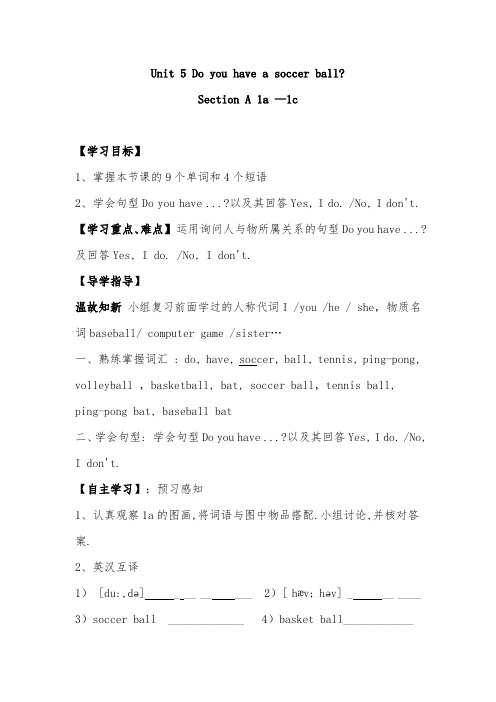
Unit 5 Do you have a soccer ball?Section A 1a —1c【学习目标】1、掌握本节课的9个单词和4个短语2、学会句型Do you have ...?以及其回答Yes, I do. /No, I don't. 【学习重点、难点】运用询问人与物所属关系的句型Do you have ...?及回答Yes, I do. /No, I don't.【导学指导】温故知新小组复习前面学过的人称代词I /you /he / she,物质名词baseball/ computer game /sister…一、熟练掌握词汇 : do, have, soccer, ball, tennis, ping-pong, volleyball ,basketball, bat, soccer ball,tennis ball,ping-pong bat, baseball bat二、学会句型: 学会句型Do you have ...?以及其回答Yes, I do. /No,I don't.【自主学习】:预习感知1、认真观察1a的图画,将词语与图中物品搭配.小组讨论,并核对答案.2、英汉互译1) [du:,də] _ __ __ ___ 2)[ hæv; həv] _ __ ____ 3)soccer ball _____________ 4)basket ball____________5)棒球棒 _____ ________ 6)网球_____ 7)(英式)足球___ __ 8).三个篮球3、补全对话A: ________ you have a pencil ?B: Yes,______ do.A: Do you _______ a CD ?B: No, I _________.A: Thank you.B: You’re___________.【合作探究】(1)教师检查学生自主学习完成情况。
七年级英语上册Unit5Doyouh第1课时Gram 学案人教
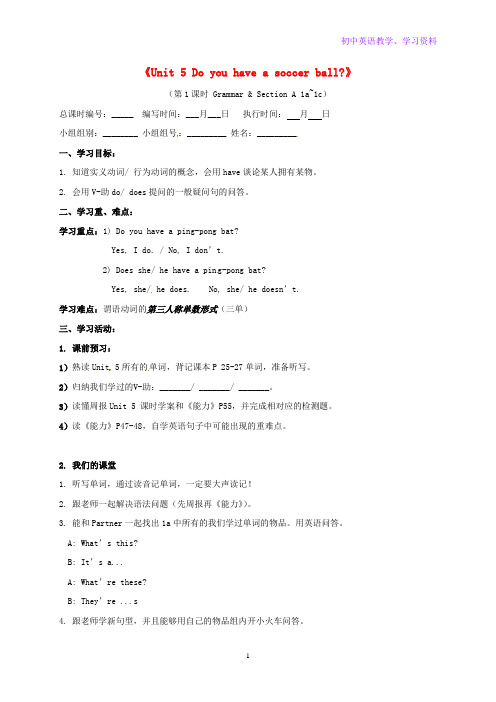
《Unit 5 Do you have a soccer ball?》(第1课时 Grammar & Section A 1a~1c)总课时编号:_____ 编写时间:___月___日执行时间:月日小组组别:________ 小组组号:_________ 姓名:_________一、学习目标:1. 知道实义动词/ 行为动词的概念,会用have谈论某人拥有某物。
2. 会用V-助do/ does提问的一般疑问句的问答。
二、学习重、难点:学习重点:1) Do you have a ping-pong bat?Yes, I do. / No, I do n’t.2) Does she/ he have a pin g-pong bat?Yes, she/ he does. No, she/ he doesn’t.学习难点:谓语动词的第三人称单数形式(三单)三、学习活动:1. 课前预习:1)熟读Unit 5所有的单词,背记课本P 25-27单词,准备听写。
2)归纳我们学过的V-助:_______/ _______/ _______。
3)读懂周报Unit 5 课时学案和《能力》P55,并完成相对应的检测题。
4)读《能力》P47-48,自学英语句子中可能出现的重难点。
2. 我们的课堂1. 听写单词,通过读音记单词,一定要大声读记!2. 跟老师一起解决语法问题(先周报再《能力》)。
3. 能和Partner一起找出1a中所有的我们学过单词的物品。
用英语问答。
A: What’s this?B: It’s a...A: What’re these?B: They’re ...s4. 跟老师学新句型,并且能够用自己的物品组内开小火车问答。
A: Do you have a pen?B: Yes, I do. / No, I do n’t.A: Does she/ he have an eraser?B: Yes, she/ he does. No, she/ he doesn’t.5. 完成课本任务1a~1c。
英语八年级上册unit 5单元预习指导设计
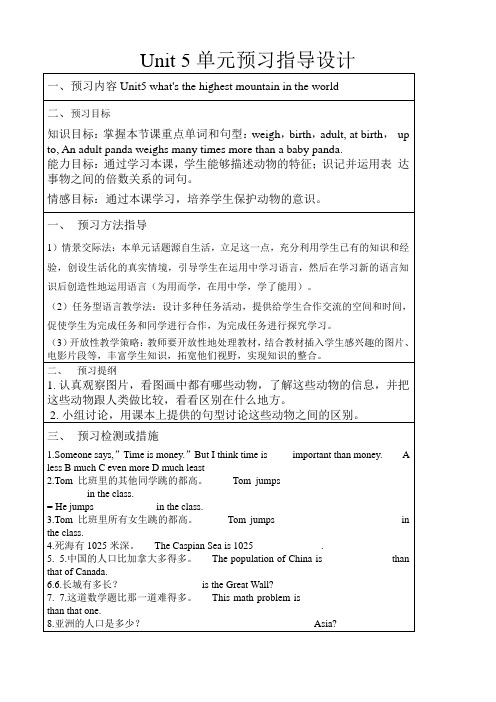
情感目标:通过本课学习,培养学生保护动物的意识。
一、预习方法指导
1)情景交际法:本单元话题源自生活,立足这一点,充分利用学生已有的知识和经验,创设生活化的真实情境,引导学生在运用中学习语言,然后在学习新的语言知识后创造性地运用语言(为用而学,在用中学,学了能用)。
4.死海有1025米深。The Caspian Sea is 1025 _______ _____ .
5.5.中国的人口比加拿大多得多。The population of China is _____ _______ than that of Canada.
6.6.长城有多长?______ _______ is the Great Wall?
7.7.这道数学题比那一道难得多。This math problem is __ ____ ____ _________ than that one.
8.亚洲的人口是多少?___________ ____ ___________ ___ Asia?
2.小组讨论,用课本上提供的句型讨论这些动物之间的区别。
三、预Байду номын сангаас检测或措施
1.Someone says,”Time is money.”But I think time is ____ important than money. A less B much C even more D much least
2.Tom比班里的其他同学跳的都高。Tom jumps _______ _____ ___ _______ ________in the class.
= He jumps ____ _______ in the class.
五年级上册英语教案-Unit 5 What do you do 课时3 ( Grammar time
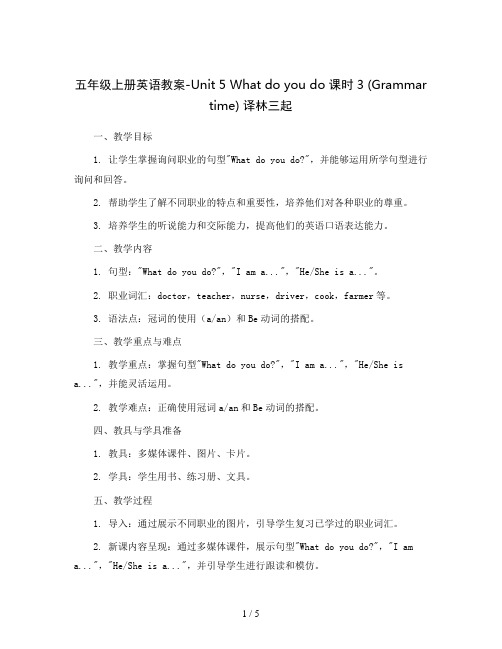
五年级上册英语教案-Unit 5 What do you do 课时3 (Grammartime) 译林三起一、教学目标1. 让学生掌握询问职业的句型"What do you do?",并能够运用所学句型进行询问和回答。
2. 帮助学生了解不同职业的特点和重要性,培养他们对各种职业的尊重。
3. 培养学生的听说能力和交际能力,提高他们的英语口语表达能力。
二、教学内容1. 句型:"What do you do?","I am a...","He/She is a..."。
2. 职业词汇:doctor,teacher,nurse,driver,cook,farmer等。
3. 语法点:冠词的使用(a/an)和Be动词的搭配。
三、教学重点与难点1. 教学重点:掌握句型"What do you do?","I am a...","He/She isa...",并能灵活运用。
2. 教学难点:正确使用冠词a/an和Be动词的搭配。
四、教具与学具准备1. 教具:多媒体课件、图片、卡片。
2. 学具:学生用书、练习册、文具。
五、教学过程1. 导入:通过展示不同职业的图片,引导学生复习已学过的职业词汇。
2. 新课内容呈现:通过多媒体课件,展示句型"What do you do?","I ama...","He/She is a...",并引导学生进行跟读和模仿。
3. 实践练习:学生分组进行角色扮演,运用所学句型进行询问和回答。
4. 语法讲解:通过例句和练习,讲解冠词a/an和Be动词的搭配,帮助学生理解和掌握。
5. 小结与作业布置:对本节课的内容进行小结,并布置相关的作业。
六、板书设计1. 句型:"What do you do?","I am a...","He/She is a..."。
人教版八年级英语上册unit5预习导案
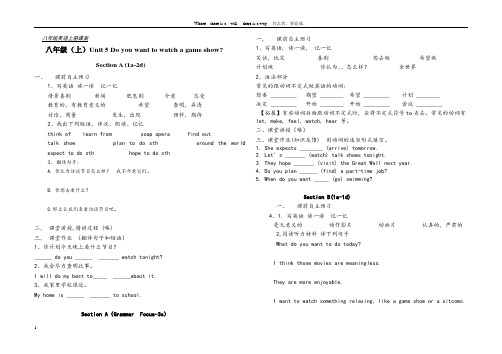
八年级英语上册课案八年级(上)Unit 5 Do you want to watch a game show?Section A (1a-2d)一、课前自主预习1、写英语 读一读 记一记情景喜剧 新闻 肥皂剧 介意 忍受 教育的,有教育意义的 希望 查明,弄清 讨论,商量 发生,出现 预料,期待 2、找出下列短语,译汉、朗读、记忆think of learn from soap opera find outtalk show plan to do sth around the worldexpect to do sth hope to do sth 3、 翻译句子: A. 你认为访谈节目怎么样? 我不介意它们。
B. 你想去看什么?C.那么让我们来看访谈节目吧。
二, 课堂讲授,精讲过程 (略) 三, 课堂作业 (翻译句子和短语) 1、你计划今天晚上看什么节目?______ do you ______ _______ watch tonight? 2、我会尽力查明此事。
I will do my best to_____ ______about it. 3、我家里学校很近。
My home is ______ _______ to school.Section A (Grammar Focus-3c )一, 课前自主预习 1、写英语, 读一读, 记一记笑话,玩笑 喜剧 想去做 希望做 计划做 你认为、、怎么样? 全世界 2、语法部分常见的跟动词不定式做宾语的动词:想要 _________ 期望 ________ 希望 _________ 计划 ________ 决定 _________ 开始 ________ 开始 _________ 尝试 _________【拓展】有些动词后面跟动词不定式时, 应将不定式符号to 省去。
常见的动词有 let, make, feel, watch, hear 等。
二、课堂讲授(略)三、课堂作业(知识反馈) 用动词的适当形式填空。
八年级上册英语 Unit 5 Do you want to watch a game show_ 预习学案
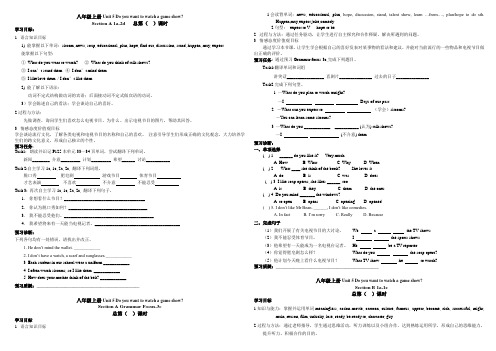
八年级上册Unit 5 Do you want to watch a game show?Section A 1a-2d 总第()课时学习目标:1. 语言知识目标1) 能掌握以下单词:sitcom, news, soap, educational, plan, hope, find out, discussion, stand, happen, may, expect能掌握以下句型:①What do you want to watch? ②What do you think of talk shows?③I can’t stand them. ④I don’t mind them.⑤I like/love them. / I don’t like them.2) 能了解以下语法:动词不定式结构做动词的宾语;后面接动词不定式做宾语的动词。
3)学会陈述自己的看法;学会谈论自己的喜好。
2.过程与方法:先做调查,询问学生们喜欢怎么电视节目,为什么。
出示电视节目的图片,帮助其回答。
3. 情感态度价值观目标学会谈论流行文化,了解各类电视和电视节目的名称和自己的喜欢。
注意引导学生们形成正确的文化观念,大力培养学生们的跨文化意义,形成自己独立的个性。
预习任务:Task1:朗读并识记P125本单元33—34页单词,尝试翻译下列单词。
新闻________ 介意_________ 计划_________ 希望______ 讨论___________Task 2:自主学习1a, 1c, 2a, 2c, 翻译下列词组。
脱口秀肥皂剧游戏节目体育节目下列各句均有一处错误,请找出并改正。
1. He don’t mind the wallet. ____________2. I don’t have a watch, a scarf and sunglasses.____________3. Each student in our school wear a uniform.____________4. I often watch sitcoms, so I like them. ____________5. How does your mother think of the belt? ____________预习质疑:_______________________________________________八年级上册Unit 5 Do you want to watch a game show?Section A Grammar Focus-3c总第()课时学习目标1. 语言知识目标1.会读背单词:news, educational, plan, hope, discussion, stand, talent show, learn …from…., plan/hope to do sth.Happen,may,expect,joke,comedy2.句型:expect to V hope to be2. 过程与方法:通过任务驱动,让学生进行自主探究和合作释疑,解决所遇到的问题。
- 1、下载文档前请自行甄别文档内容的完整性,平台不提供额外的编辑、内容补充、找答案等附加服务。
- 2、"仅部分预览"的文档,不可在线预览部分如存在完整性等问题,可反馈申请退款(可完整预览的文档不适用该条件!)。
- 3、如文档侵犯您的权益,请联系客服反馈,我们会尽快为您处理(人工客服工作时间:9:00-18:30)。
play computer games 4. 玩电脑游戏_____________________
play volleyball 5. 打排球 ______________________
课前预习
三、经典句型
1. —— 他们有一个篮 —Do球Βιβλιοθήκη ?theyhave
a
basketball?
—— 是的,他们有。 / —Yes,they do. /No, 不,他们没有。他们 they don’t. They have 有一个排球。 a volleyball.
我对这本书很感兴趣。
谢 谢 观 看 !
课前预习
三、经典句型
2. —— 他有一个足球 —Does
吗?
he
have
a
soccer ball?
——是的,他有。/ 不, —Yes,he does. /No, 他没有。他有两个乒 he doesn’t. He has 乓球拍。 two ping-pong bats.
课前预习
三、经典句型
3. —— 让我们打篮球 —Let’s
他的主意听起来不错!
思考探究
3. [区别]interesting和interested interesting表示主语的特性,意为“有趣的”, 而interested表示主语“对……
思考探究
interesting (1)This book is ________.
interested in this book. (2)I am __________
Unit 5 Do you have a soccer ball?
Period 2 预习案 (课本P27~P28)
目录 contents
学习目标 课前预习 思考探究
目录 contents
学习目标
学习目标
1. 2.
目录 contents
预习检测
课前预习
一、必背单词 名词 1. 电视;电视机 ________ TV play 2. 参加(比赛或运动);玩耍 ________ sound 动词 3. 听起来好像 ________ 4. 观看;注视 ________ watch
课前预习
一、必背单词
great 5. 美妙的;伟大的 ________
6. 有趣的 ________ interesting boring 形容词 7. 没趣的;令人厌倦的 ________ difficult /hard 8. 困难的 ________ relaxing 9. 轻松的;令人放松的 ________
课前预习
一、必背单词 兼词 10. adj. ,使人快乐的 n.
快乐,乐趣 ________ fun
课前预习
二、重点短语
sound good 1. 听起来不错_____________________
watch TV 2. 看电视 _____________________ play basketball 3. 打篮球 _____________________
用冠词the
思考探究
football /soccer (1)play __________________
the piano (2)play __________________ 弹钢琴
思考探究
2. That sounds good. 那听起来不错。 sound是系动词,后面接形容词作表语。 sounds good His idea___________________________!
吧。 basketball.
play
——那听起来不错。 —That sounds good.
目录 contents
思考探究
思考探究
1. Well, let’s play basketball. 噢,我们去打篮球吧。 play是动词,意为“参加;玩耍”,后可接球 类名词,但名词前不能用冠词;play后还能接 表示乐器的名词,意为 “弹,拉”,名词前须
